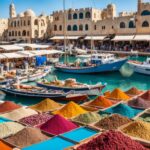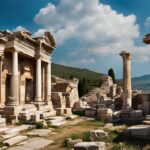Welcome to Sidon, an ancient city nestled along the picturesque Mediterranean coastline of Lebanon. With its rich historical significance, Sidon is a treasure trove of archaeological ruins and a captivating tourist attraction. Let’s delve into the fascinating world of this Phoenician civilization and discover the hidden gems that await.
Steeped in biblical importance, Sidon is mentioned in various religious texts, tying it to notable figures and significant events. From the Canaanite princess who married Esau’s son to the encounters between Jesus and the Gentile woman, Sidon’s biblical connections have shaped its history and religious landscape.
In ancient times, Sidon stood as a glorious city, renowned for its impressive architecture and thriving economy. Grand temples and palaces adorned the landscape, reflecting the city’s cultural, trade, and religious prominence. It played a pivotal role in maritime trade, making it a hub of activity and an influential center.
Major biblical events further impacted Sidon’s history, marking it as a place of interaction and conflict between different cultures and religions. The apostles preached in the city, leaving their mark, while encounters between Jesus and the people of Sidon showcased the city’s religious and societal dynamics.
Today, Sidon seamlessly blends its ancient past with modern developments, inviting visitors to explore its cultural heritage and indulge in its culinary delights. From well-preserved archaeological sites to bustling souks and vibrant markets, Sidon offers a plethora of experiences that cater to all interests.
Key Takeaways
- Sidon is an ancient city located on Lebanon’s Mediterranean coastline.
- It holds great historical significance as a prominent city in the Phoenician civilization.
- Sidon is mentioned in the Bible in connection with notable figures and events.
- The city was known for its impressive architecture and played a crucial role in maritime trade.
- Sidon’s ancient ruins and cultural experiences make it a captivating tourist attraction today.
The Biblical Significance of Sidon
Sidon, a city of great historical importance, holds significant biblical importance. Throughout the Bible, Sidon is mentioned in relation to various notable figures and events, showcasing its rich history and religious significance. From the Canaanite princess who married Esau, son of Isaac, to the encounter between the Phoenician king Ahab and the prophet Elijah, Sidon played a role in shaping biblical narratives. The city’s biblical importance is deeply intertwined with its history, religion, and the interactions between different cultures and faiths.
In the biblical narrative, Sidon served as a backdrop for pivotal events that impacted the lives of biblical figures. For example, it was in Sidon that Jesus encountered a Gentile woman seeking healing for her daughter, a moment that demonstrated the inclusivity of his message. Additionally, the apostles preached in Sidon, spreading the teachings of Christianity and leaving a lasting impact on the city’s religious landscape.
Sidon is a city that carries biblical significance, serving as a testament to the intertwined nature of history, religion, and culture. Its mention in the Bible provides a unique perspective on the city’s past and adds to its allure as a destination for those seeking to explore ancient biblical narratives.
The Biblical Figures Associated with Sidon
Several notable biblical figures are linked to Sidon, further emphasizing its biblical importance. These figures include:
- Esau – Son of Isaac and the Canaanite princess who married him.
- Ahab – The Phoenician king who ruled over Sidon during the 9th century BCE.
- Elijah – The prophet who challenged Ahab and performed miracles in Sidon.
- The Canaanite woman – A Gentile woman who sought healing for her daughter from Jesus.
- The apostles – Early followers of Jesus who preached in Sidon, spreading the teachings of Christianity.
These figures and their interactions in Sidon are significant in biblical narratives and contribute to the city’s religious and historical importance.
| Biblical Events | Impact on Sidon |
|---|---|
| Marriage of Esau and Canaanite princess | Built connections between different cultures and religions. |
| Encounter between Ahab and Elijah | Challenged religious practices of the time and showcased the power of the prophet. |
| Jesus’ healing of the Canaanite woman’s daughter | Demonstrated the inclusivity of Jesus’ message and the power of faith. |
| Apostles preaching in Sidon | Spread the teachings of Christianity and influenced the city’s religious landscape. |
Ancient Sidon: A Look into the Past
Sidon, once a thriving ancient city, was an integral part of the Phoenician civilization. In biblical times, it played a significant role in maritime trade and was known for its impressive architecture and cultural importance.
The city boasted grand temples and palaces, showcasing the wealth and power of the Phoenician people. It functioned as a center for trade, culture, and religious practices, with its inhabitants worshiping a variety of deities.
According to historical records and archaeological findings, Sidon had a prominent harbor, enabling it to establish strong connections and engage in prosperous trade with other ancient civilizations. The city’s location on the Mediterranean coast made it a desirable destination for merchants and traders from near and far.
“Sidon was a hub of commerce and cultural exchange, attracting visitors and traders from all corners of the ancient world. Its well-preserved ruins and impressive architecture are a testament to the city’s rich history and influence in the region.”
The Function of Sidon in Biblical Times
Sidon’s function in biblical times was multi-faceted. Aside from serving as a thriving trade center, it was also mentioned in religious texts and played a role in various biblical events. Notable figures such as Canaanite princesses, influential kings, and renowned prophets walked its ancient streets, leaving their mark on the city’s history and biblical significance.
The ruins of Sidon stand as a testament to its glorious past, offering visitors a glimpse into the once-flourishing Phoenician civilization. Today, these archaeological sites continue to attract tourists from all over the world, who come to marvel at the historical appearance and learn about the city’s function in ancient times.
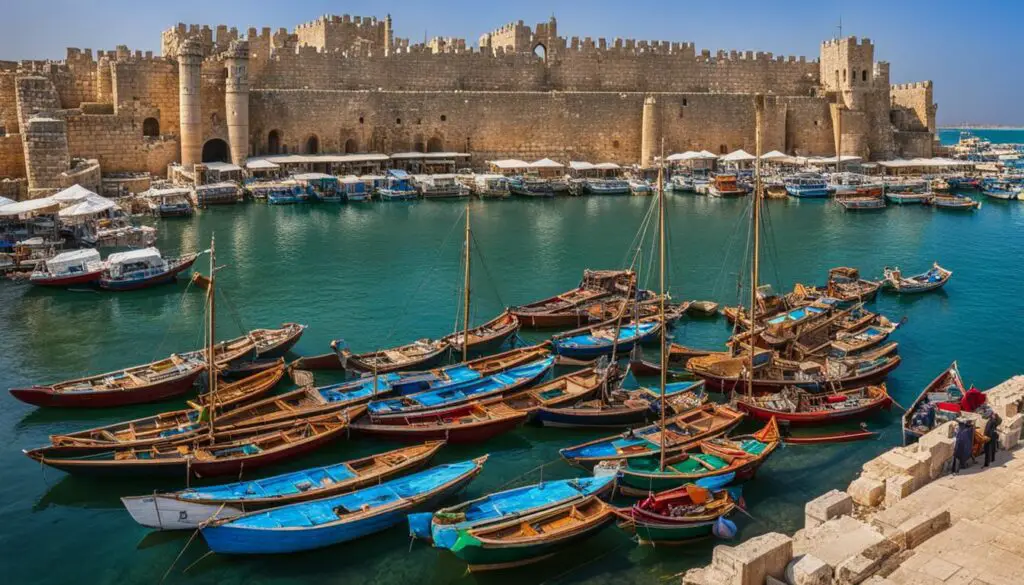
| Table: Sidon’s Function in Biblical Times | |
|---|---|
| Trade Center | Sidon served as a vital hub for maritime trade, connecting ancient civilizations and facilitating the exchange of goods and ideas. |
| Cultural Center | The city was a center for culture and religious practices, attracting worshipers of various deities and fostering cultural diversity. |
| Religious Significance | Sidon is mentioned in biblical texts, playing a role in various events involving significant figures and prophets. |
Major Biblical Events in Sidon
Sidon, with its rich biblical history, witnessed several major events that had a significant impact on its historical significance. These events highlight the city’s role as a hub of cultural and religious interactions. From encounters with biblical figures to the spread of Christianity, Sidon played a crucial role in shaping religious and historical landscapes.
One notable event that took place in Sidon was the encounter between Jesus and a Gentile woman seeking healing for her daughter. This event, documented in the Gospel of Matthew, serves as a testament to the inclusivity of Jesus’ ministry and demonstrates the diverse religious and cultural makeup of Sidon during biblical times.
“And behold, a Canaanite woman from that region came out and was crying, ‘Have mercy on me, O Lord, Son of David; my daughter is severely oppressed by a demon.’ But he did not answer her a word.” (Matthew 15:22-23)
Additionally, the preaching of the apostles in Sidon played a significant role in the spread of Christianity. The ancient city served as a pivotal location for the early Christian missionaries, allowing the teachings of Jesus to reach a wider audience. These efforts laid the foundation for the growth of Christianity in the region and contributed to the city’s religious and historical importance.
Overall, the major biblical events that occurred in Sidon highlight its cultural significance and its role in the religious history of the region. These events continue to shape the city’s identity and attract visitors who seek a deeper understanding of the interconnectedness between biblical narratives and historical contexts.
| Biblical Event | Historical Significance |
|---|---|
| The encounter between Jesus and the Canaanite woman | Demonstrates the inclusivity of Jesus’ ministry and the diverse religious and cultural makeup of Sidon. |
| The preaching of the apostles in Sidon | Contributed to the spread of Christianity in the region and established Sidon as a significant location for early Christian missionary efforts. |
Sidon Today: A Modern Perspective
Sidon, once an ancient city with a rich history, has embraced modern developments while preserving its cultural heritage. Today, it is a thriving modern city that offers visitors a unique blend of ancient ruins, vibrant markets, and culinary delights. With its stunning Mediterranean coastline and warm hospitality, Sidon has become a popular destination for tourists seeking a taste of authentic Lebanese culture and unforgettable experiences.
When visiting Sidon, tourists are greeted with a vibrant atmosphere and a wide range of activities to indulge in. The city’s well-preserved archaeological sites, such as the Sea Castle and the historic Sidon Souks, provide a glimpse into its ancient grandeur. One can wander through the narrow streets of the souks, filled with the aromas of local spices and the vibrant colors of handmade crafts, and immerse themselves in the local culture.
To truly experience Sidon’s modern charm, visitors can explore its culinary delights. The city is renowned for its Lebanese cuisine, known for its flavorful mezze dishes and fresh seafood specialties. From small street vendors to elegant restaurants, Sidon offers a variety of dining options where visitors can savor the authentic flavors of the region.
For those seeking relaxation, Sidon’s beautiful beaches along the Mediterranean coastline provide the perfect escape. Whether it’s sunbathing on the golden sands or taking a refreshing swim in the crystal-clear waters, the city’s beaches offer a tranquil retreat from the bustling streets.
Overall, Sidon today is a modern city that seamlessly blends its ancient history with contemporary developments. It invites visitors to explore its well-preserved ruins, wander through vibrant markets, and indulge in delicious cuisine. With its rich cultural heritage and warm hospitality, Sidon offers a truly unique and unforgettable experience for travelers.
Ancient Ruins: Must-See Attractions
Sidon is a treasure trove of ancient ruins that offer a glimpse into its illustrious past. These archaeological sites are not only historically significant but also major tourist attractions that draw visitors from all around the world. Exploring these ancient ruins is like stepping back in time and immersing oneself in the rich cultural heritage of Sidon.
The Temple of Bacchus
One of the must-see attractions in Sidon is the Temple of Bacchus, located in the ancient city of Baalbek. This Roman temple is an architectural marvel and is considered one of the best-preserved Roman temples in the world. Its grandeur and intricate details leave visitors in awe of the craftsmanship of ancient times. The Temple of Bacchus stands as a testament to the city’s rich historical legacy.
The Sea Castle in Saida
Another iconic ancient ruin in Sidon is the Sea Castle, situated in the coastal city of Saida. This imposing fortress dates back to the 13th century and offers stunning views of the Mediterranean Sea. The Sea Castle has witnessed centuries of history and has been used for various purposes, from a defensive structure to a prison. Today, it stands as a symbol of Sidon’s resilience and enduring heritage.
The Roman Columns in Tyre
Visitors to Sidon should also make sure to visit the ancient city of Tyre, where they can marvel at the impressive Roman columns lining the coast. These ancient pillars stand tall, creating a picturesque scene against the backdrop of the sparkling Mediterranean Sea. The Roman columns are a testament to the city’s prosperous past as a major trading hub and UNESCO World Heritage Site.
Exploring these ancient ruins in Sidon is an absolute must for history enthusiasts and travelers seeking a deeper understanding of the city’s rich heritage. The Temple of Bacchus, the Sea Castle in Saida, and the Roman columns in Tyre are just a few of the remarkable ancient attractions that await visitors to Sidon.
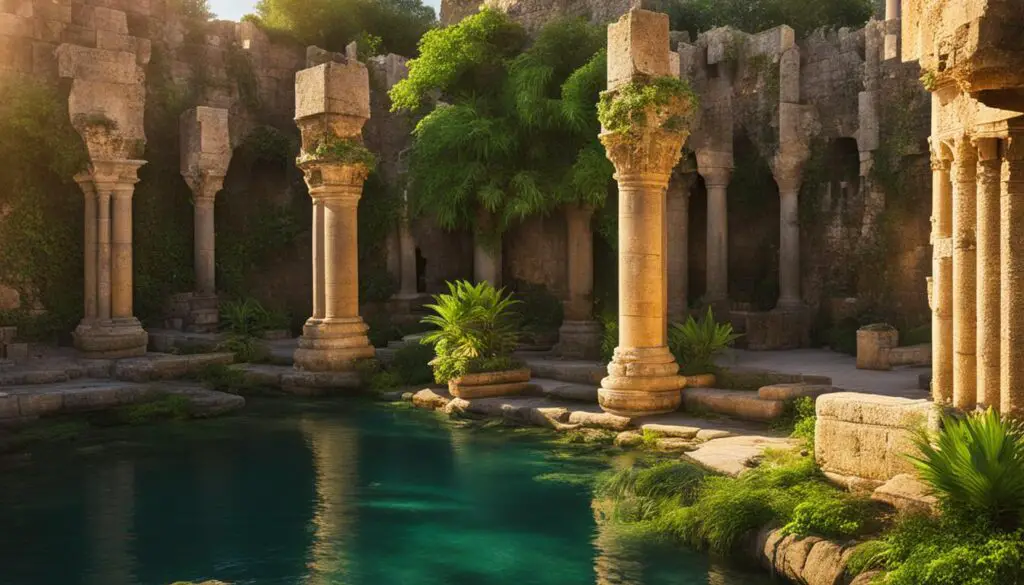
Discovering Sidon’s Souks and Markets
One of the highlights of visiting Sidon is exploring its vibrant souks, or open markets. These bustling marketplaces offer a glimpse into the local culture and provide an opportunity to immerse yourself in the lively atmosphere of Sidon’s shopping scene. Whether you’re a seasoned shopper or simply interested in experiencing the local way of life, Sidon’s souks and markets are a must-visit attraction.
As you meander through the narrow alleys of the souks, you’ll be greeted by an array of sights, sounds, and aromas. The stalls are filled with a variety of goods, ranging from traditional handicrafts and textiles to fresh produce and spices. You can browse through intricately woven rugs, ornate ceramics, and beautifully crafted jewelry, all while engaging with friendly vendors who are eager to share their stories and knowledge about the products.
Don’t miss the opportunity to sample the local delicacies available in the souks. From mouthwatering street food like falafel and shawarma to delectable sweets like baklava and knafeh, there is something to satisfy every culinary craving. Embrace the flavors of Sidon as you indulge in these authentic dishes, made with love and passed down through generations.
Exploring the souks and markets of Sidon is not just about shopping and eating—it’s also a chance to immerse yourself in the local culture. Take the time to observe the bustling activity, interact with the friendly locals, and learn about their way of life. Whether you’re searching for unique souvenirs or simply want to experience an authentic slice of Sidon, the souks and markets offer a memorable and enriching experience.
The Vibrant Souks of Sidon
When visiting Sidon, make sure to explore its vibrant souks and markets. These bustling marketplaces provide a unique opportunity to immerse yourself in the local culture and experience the lively atmosphere of this ancient city. Here are some highlights of what you can expect:
- Traditional Handicrafts: Discover a wide range of locally made handicrafts, including intricately woven rugs, beautifully embroidered textiles, and hand-painted ceramics. These unique souvenirs make for memorable gifts or keepsakes.
- Fresh Produce and Spices: The markets are filled with colorful stalls offering an array of fresh fruits, vegetables, herbs, and spices. Take in the vibrant sights and fragrant aromas as you wander through these vibrant sections of the souks.
- Street Food Delights: Sample the delicious street food available in the souks, from mouthwatering falafel and shawarma wraps to sweet treats like baklava and knafeh. These flavorsome dishes are a true reflection of Sidon’s culinary heritage.
Whether you’re a seasoned shopper, a food enthusiast, or simply a curious traveler, a visit to Sidon’s souks and markets is an essential part of immersing yourself in the local culture and experiencing the vibrant spirit of this ancient city.
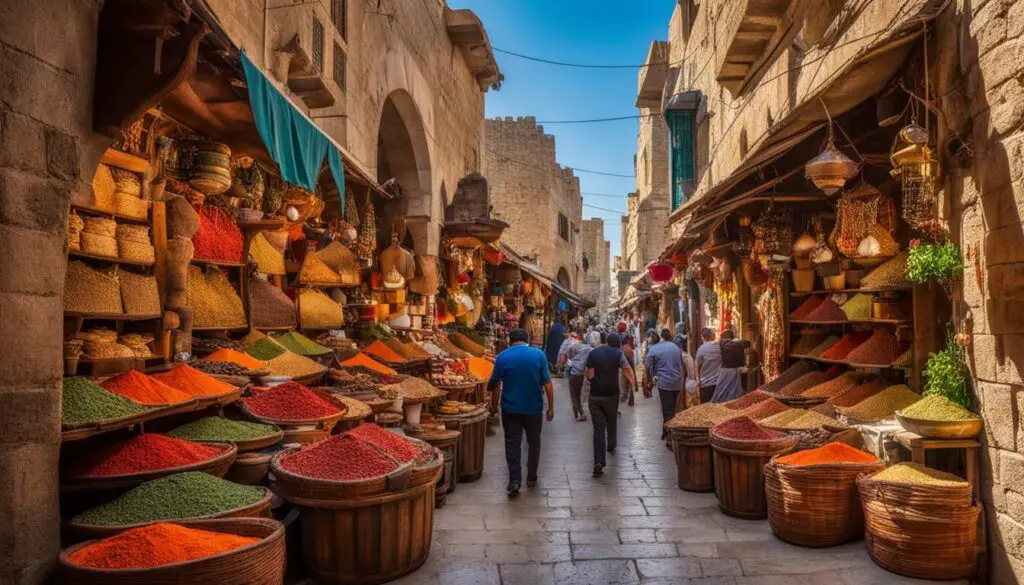
Sidon’s Beautiful Beaches and Coastline
Sidon, located on the Mediterranean coastline of Lebanon, is not only rich in historical and cultural heritage but also offers stunning beaches and a picturesque coastline. These pristine beaches provide the perfect setting for leisure and relaxation, allowing visitors to unwind and enjoy the beauty of the Mediterranean Sea.
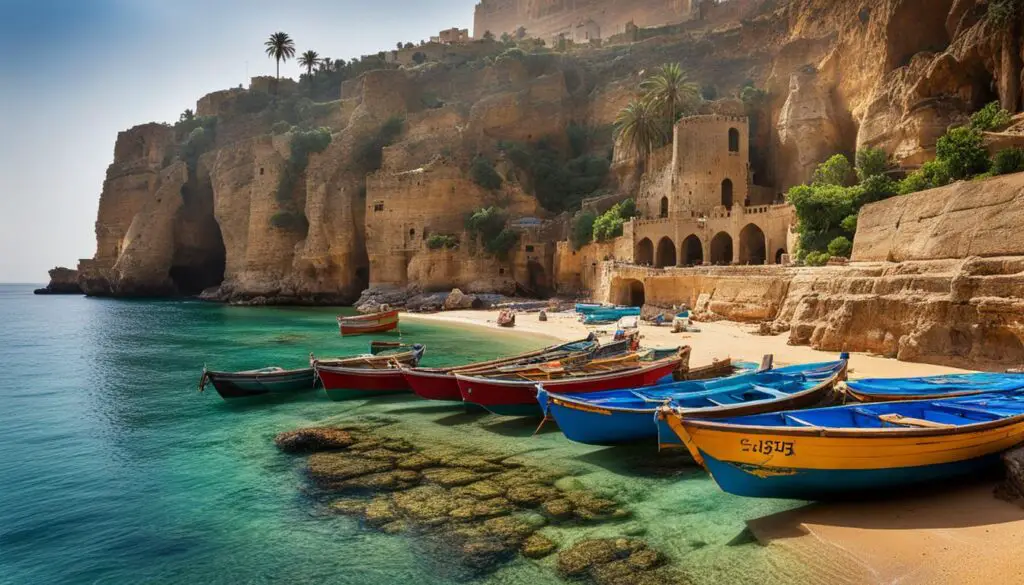
With crystal-clear waters and soft sandy shores, Sidon’s beaches are a haven for beach lovers. Whether you prefer swimming, sunbathing, or simply taking a leisurely stroll along the shore, you’ll find the perfect spot to unwind and soak up the sun’s rays. The gentle waves of the Mediterranean Sea create a soothing atmosphere, making it an ideal destination for those seeking tranquility.
For water sports enthusiasts, Sidon offers various activities such as snorkeling, scuba diving, and jet skiing. Explore the vibrant underwater world and discover the rich marine life that inhabits these coastal waters. The warm Mediterranean climate adds to the allure, ensuring pleasant beach weather throughout most of the year.
Sidon’s beautiful beaches and coastline are a testament to the city’s natural beauty, providing an idyllic escape for leisure and relaxation.
Exploring Sidon’s Culinary Delights
Sidon is renowned for its exquisite Lebanese cuisine, and exploring the city’s culinary scene is a must for food enthusiasts. With a rich culinary heritage influenced by Mediterranean flavors and Middle Eastern spices, Sidon offers a diverse range of delectable dishes that will tantalize your taste buds.
One of the highlights of Sidon’s culinary offerings is the mezze, a selection of small dishes served as appetizers or a meal in itself. From creamy hummus and smoky baba ghanoush to vibrant tabbouleh and stuffed grape leaves, the mezze experience in Sidon is a true feast for the senses.
Seafood lovers will also be delighted by the fresh catches available in Sidon. The city’s proximity to the Mediterranean Sea ensures that the seafood served is of the highest quality. From grilled whole fish to succulent prawns and aromatic fish stews, Sidon’s seafood dishes are simply irresistible.
When visiting Sidon, be sure to explore the bustling local restaurants and street vendors that dot the city. These culinary hotspots offer an authentic taste of Lebanese cuisine, with their vibrant atmospheres and mouthwatering flavors. Whether you’re craving fragrant kebabs, juicy shawarma, or indulgent baklava, Sidon’s restaurants will satisfy your every craving.
Table: Famous Lebanese Dishes in Sidon
| Dish | Description | Ingredients |
|---|---|---|
| Kibbeh | A traditional Lebanese dish made of minced meat and bulgur wheat, served either raw or baked | Ground beef or lamb, bulgur wheat, onions, spices |
| Manakish | Lebanese flatbread topped with a variety of ingredients such as za’atar, cheese, or minced meat | Flatbread dough, za’atar spice mix, olive oil, optional toppings |
| Fattoush | A refreshing salad made with crispy pita bread, fresh vegetables, and a tangy sumac dressing | Pita bread, lettuce, tomatoes, cucumbers, radishes, herbs, olive oil, lemon juice, sumac |
| Moussaka | A baked dish made with layers of eggplant, minced meat, tomatoes, and topped with a creamy béchamel sauce | Eggplant, ground beef or lamb, tomatoes, onions, garlic, spices, béchamel sauce |
Immersing in Sidon’s Cultural Heritage
Sidon, with its rich cultural heritage, offers visitors a unique opportunity to delve into the city’s past through its museums and historical sites. These cultural attractions provide invaluable insights into the vibrant history and traditions that have shaped Sidon over the centuries.
Museums:
One of the must-visit cultural landmarks in Sidon is the Soap Museum. Located in an ancient soap factory, this fascinating museum takes visitors on a journey through the traditional soap-making process that has been practiced in Sidon for generations. From raw materials to the final product, the museum showcases the craftsmanship and expertise behind this historic industry. The Soap Museum offers an immersive experience, allowing visitors to witness demonstrations and even participate in soap-making workshops.
Another notable museum in Sidon is the Khan Al Franj. This ancient inn dates back to the Crusader period and serves as a testament to the architectural beauty of that era. Visitors can explore the inn’s intricate arches, courtyard, and rooms, gaining a deeper understanding of the historical significance of Sidon. The Khan Al Franj also hosts exhibitions that highlight various aspects of Sidon’s history, such as its maritime heritage and cultural traditions.
Historical Sites:
In addition to museums, Sidon is home to several remarkable historical sites that showcase the city’s rich cultural heritage. The Sea Castle, located on a small island off the coast of Sidon, is a prime example. This ancient fortress has been a witness to countless historical events and has served various purposes throughout its existence. Today, visitors can explore the Sea Castle’s imposing structure and enjoy panoramic views of the surrounding coastline.
Another noteworthy historical site is the Temple of Eshmoun, an ancient Phoenician sanctuary dedicated to the god of healing and fertility. The temple’s ruins provide a glimpse into the religious practices of the Phoenicians and the architectural grandeur of ancient Sidon. Exploring these historical sites allows visitors to immerse themselves in the captivating history and cultural heritage of Sidon.
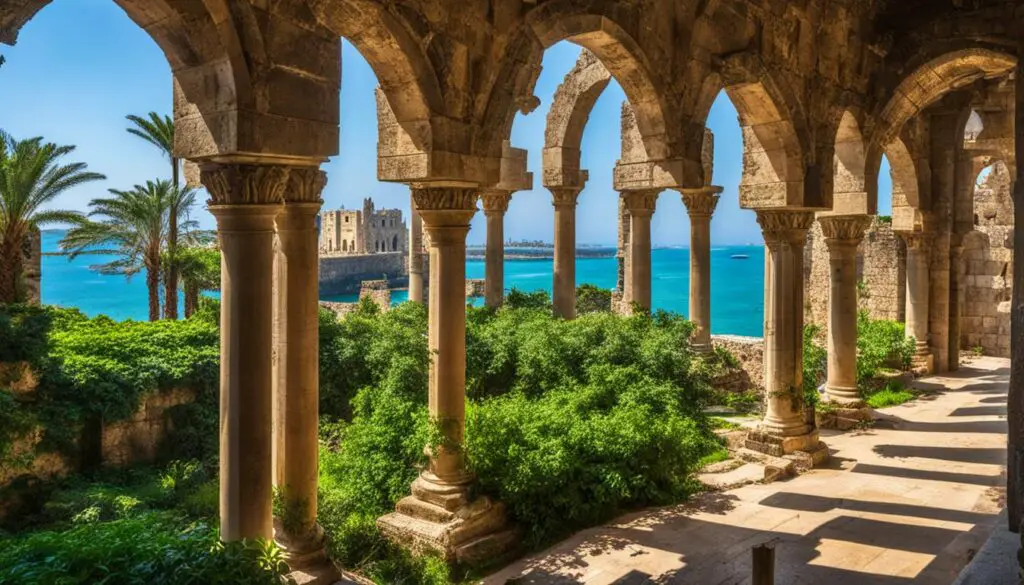
Conclusion
Sidon, located in Lebanon, is a city that holds a significant place in ancient history. With its rich biblical importance and notable figures linked to it, Sidon offers a captivating journey into the past. In biblical times, Sidon was a thriving city known for its impressive architecture and functioned as a center for culture, trade, and religious practices.
The major biblical events that took place in Sidon shaped its history and religious landscape. From Jesus’ encounter with a Gentile woman seeking healing to the preaching of the apostles in the city, these events left a lasting impact. Today, Sidon seamlessly blends its ancient history with modern developments, offering visitors a unique blend of archaeological wonders, cultural experiences, and culinary delights.
As a popular tourist destination, Sidon welcomes travelers to explore its well-preserved ruins, vibrant souks, and beautiful beaches along the Mediterranean coastline. Whether it’s immersing in the city’s cultural heritage at museums and historical sites or indulging in delicious Lebanese cuisine, a visit to Sidon promises an unforgettable experience that combines ancient history, tourism, and cultural richness. Discover the treasures of Sidon and embark on a journey through time in the captivating country of Lebanon.
FAQ
Can I visit Sidon’s archaeological ruins?
Yes, Sidon is known for its well-preserved archaeological ruins that can be visited by tourists.
What is the biblical significance of Sidon?
Sidon holds great biblical importance, with mentions in relation to various notable figures and significant biblical events taking place in the city.
What can I expect to see in ancient Sidon?
In ancient Sidon, you can expect to see impressive architecture, including grand temples and palaces, along with evidence of its thriving maritime trade and cultural practices.
What major biblical events took place in Sidon?
Sidon witnessed several major biblical events, including encounters between Jesus and a Gentile woman, as well as the preaching of the apostles in the city.
Is Sidon a modern city?
Yes, Sidon has blended its rich history with modern developments, making it a thriving city with a range of cultural experiences and tourist attractions.
What are some must-see ancient ruins in Sidon?
Sidon is home to several must-see ancient ruins, including the Temple of Bacchus in Baalbek, the Sea Castle in Saida, and the Roman columns in Tyre.
Can I shop for unique goods in Sidon?
Yes, Sidon’s vibrant souks and markets offer a wide range of unique goods and fresh produce, providing a glimpse into the local culture.
Are there beaches in Sidon?
Yes, Sidon boasts a beautiful coastline along the Mediterranean Sea, offering pristine beaches where visitors can relax and enjoy the sun.
Is Sidon known for its cuisine?
Absolutely! Sidon is renowned for its exquisite Lebanese cuisine, with plenty of restaurants and street vendors offering authentic flavors of the region.
Are there museums and historical sites in Sidon?
Yes, Sidon has several museums and historical sites, such as the Soap Museum and Khan Al Franj, where visitors can learn about the city’s history and heritage.


